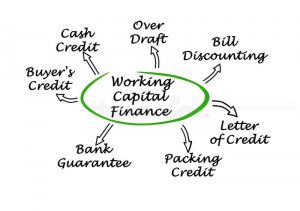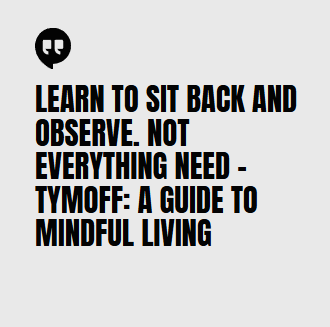
Introduction
“Learn to sit back and observe. Not everything need – Tymoff” is more than just a phrase; it’s a mantra for embracing mindfulness and cultivating peace in a world that often demands constant action and reaction. In today’s fast-paced society, the pressure to always be doing something, solving every problem, or responding to every stimulus can feel overwhelming. However, the art of stepping back, observing, and choosing where to invest your energy is an essential skill that can transform your personal and professional life.
This approach isn’t about apathy or passivity; it’s about developing the wisdom to differentiate between what truly requires your attention and what can simply be acknowledged without reaction. By learning to observe without immediate judgment or action, you give yourself the space to process situations thoughtfully, reduce stress, and make decisions that align with your values.
In this blog, we’ll explore why adopting this mindset is so powerful, how it can help you regain control over your mental and emotional well-being, and practical ways to integrate this principle into your daily routine. Whether you’re navigating workplace challenges, personal relationships, or simply seeking more peace of mind, learning to sit back and observe could be the game-changer you’ve been looking for.
So, let’s dive into this journey of mindful observation and discover how “not everything need” your immediate response. Sometimes, the best action is no action at all.
Learn to Sit Back and Observe: Tymoff’s Secret to Finding Inner Peace
In a world that often feels like it’s spinning too fast, the ability to sit back and observe is a gift. Tymoff’s message, “Learn to sit back and observe. Not everything need,” reminds us to embrace a quieter, more mindful approach to life. When you step back from the chaos, you gain the clarity to see things for what they truly are rather than reacting based on emotions or assumptions. This practice creates space for inner peace, allowing you to focus on what matters while letting go of what doesn’t. By observing rather than acting impulsively, you cultivate a sense of control over your mind and emotions, unlocking a calmer, more centered version of yourself.
Why “Not Everything Need – Tymoff” Is a Life Lesson We All Should Embrace
Not every situation demands your attention, reaction, or energy. Tymoff’s philosophy urges us to pause and ask, “Is this worth my focus right now?” It’s a lesson in discernment that challenges the instinct to overanalyze, fix, or respond to every problem. By recognizing that not everything needs immediate action, you conserve your energy for the things that truly align with your values and goals. This perspective not only reduces stress but also fosters a deeper understanding of life’s priorities. In a world of endless noise and demands, this lesson can be a pathway to living more intentionally and peacefully.
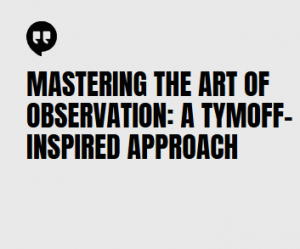
Mastering the Art of Observation: A Tymoff-Inspired Approach
Observation is an underrated skill, often overshadowed by the urge to act. Tymoff’s approach teaches us that mastering observation can transform how we navigate life. By stepping back and simply noticing, we gather crucial insights that might otherwise be missed in the rush to respond. Observation allows you to understand people and situations more deeply, equipping you to make thoughtful decisions. Whether it’s observing your own thoughts or the dynamics of a conversation, this skill empowers you to act from a place of clarity and wisdom rather than impulsivity.
How Sitting Back and Observing Can Change Your Perspective on Life
When you take a step back, the world begins to look different. The simple act of observation creates distance between you and the intensity of your emotions, enabling you to see situations from a new perspective. It’s in this space of observation that understanding grows. Instead of viewing challenges as obstacles, you start to see them as opportunities for growth. Tymoff’s philosophy encourages this shift in perspective, reminding us that observation isn’t passive—it’s a powerful way to reshape how we engage with life’s complexities.
Tymoff’s Philosophy: Learn to Respond, Not React, in Challenging Situations
Reacting is instinctual, but responding is intentional. Tymoff’s philosophy emphasizes the importance of choosing your responses carefully, especially in challenging situations. When you react without thinking, you often escalate problems or miss opportunities for resolution. However, by sitting back and observing, you give yourself the chance to process your emotions, assess the situation, and choose a response that aligns with your values. This shift from reacting to responding can significantly improve how you handle stress, conflict, and uncertainty.
The Power of Silence: Why Not Everything Deserves a Reaction
Silence is often misunderstood as weakness, but in reality, it’s one of the most powerful tools you can wield. Tymoff’s principle of “not everything need” highlights the importance of silence in moments when a reaction feels necessary but isn’t productive. By staying silent, you conserve energy, maintain your composure, and allow situations to unfold without unnecessary interference. Silence gives you the upper hand in preserving your peace and avoiding unnecessary drama, proving that sometimes the strongest response is no response at all.
Learn to Sit Back and Observe: A Mindful Approach to Modern Life
Mindfulness is the antidote to the busyness of modern life, and observation is at its core. Tymoff’s idea of sitting back and observing fits seamlessly into this mindful approach, teaching us to be present without judgment. In a world full of distractions, learning to simply observe your surroundings, your thoughts, and your emotions can create a profound sense of grounding. This mindful observation helps you break free from autopilot mode, fostering a deeper connection to yourself and the world around you.
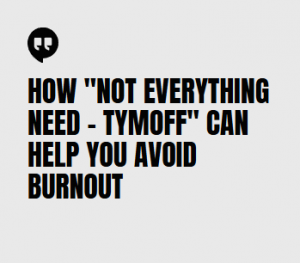
How “Not Everything Need – Tymoff” Can Help You Avoid Burnout
Burnout often stems from trying to do too much, respond to too many demands, and solve every problem that comes your way. Tymoff’s wisdom offers a solution: step back and observe. By recognizing that not everything requires your energy, you give yourself permission to rest and recharge. Observation helps you identify where your efforts are truly needed, allowing you to focus on what matters while letting go of what doesn’t. This shift in mindset can prevent the overwhelm that leads to burnout, helping you maintain balance and well-being.
Why Observation Is the Key to Better Decision-Making
Good decisions are rarely made in haste. Tymoff’s principle of observation encourages us to pause and gather information before acting. When you observe without rushing to judgment or action, you gain a clearer understanding of the situation, enabling you to make more thoughtful choices. Observation allows you to see the bigger picture, anticipate potential outcomes, and weigh your options carefully. This approach leads to better decisions that align with your goals and values, reducing the likelihood of regret.
Learn to Sit Back and Observe: Finding Freedom in Letting Go
Letting go is one of the most liberating things you can do, and observation is the first step. Tymoff’s idea of sitting back and observing teaches us that we don’t have to hold onto everything—be it emotions, expectations, or control. By simply observing, you create space to release what no longer serves you. This practice not only frees you from unnecessary burdens but also opens the door to greater peace and freedom in your daily life.
The Hidden Strength in Observing Without Acting Immediately
There is an understated power in pausing before taking action. By observing without jumping into immediate action, you demonstrate emotional intelligence and self-control. Tymoff’s philosophy teaches that this hidden strength lies in your ability to evaluate a situation without succumbing to the pressure of urgency. This pause allows you to respond thoughtfully rather than react impulsively. It is not about indecision but about making choices from a place of clarity and purpose, leading to better outcomes in both personal and professional interactions.
How “Not Everything Need – Tymoff” Can Improve Your Relationships
Relationships thrive on understanding and patience, and Tymoff’s principle is a cornerstone for both. Not every disagreement requires an argument, and not every problem needs an immediate fix. Learning to observe your partner’s emotions, listen without interjecting, and respond only when truly necessary fosters deeper connection and trust. This approach reduces unnecessary conflicts and helps you focus on what truly matters in your interactions, creating more harmonious and fulfilling relationships.
Why Observation Is More Powerful Than Immediate Action
We often equate action with productivity, but there is immense power in observation. Taking a moment to step back and watch a situation unfold can reveal insights you would otherwise miss in the rush to act. Tymoff’s principle reminds us that thoughtful observation often leads to more impactful actions. By waiting, you allow patterns to emerge, gain perspective, and act strategically rather than reflexively. In this way, observation becomes a tool for more meaningful and effective engagement with the world around you.
The Tymoff Mindset: How to Stay Calm in a Chaotic World
Chaos is inevitable, but how you respond to it is within your control. The Tymoff mindset encourages you to stay calm by observing rather than reacting. In moments of chaos, stepping back helps you detach from the intensity of the situation, giving you the mental space to process and prioritize. This calmness becomes a source of strength, allowing you to navigate challenges with grace and resilience. It’s a mindset that not only protects your peace but also inspires others to find stability in the storm.
Learn to Sit Back and Observe: Building Emotional Resilience
Emotional resilience is the ability to bounce back from adversity, and observation is a key component of building it. Tymoff’s philosophy of sitting back and observing allows you to process your emotions without being overwhelmed by them. By observing rather than reacting, you create a buffer between yourself and the triggers that might otherwise destabilize you. Over time, this practice strengthens your ability to handle life’s ups and downs with confidence and composure.
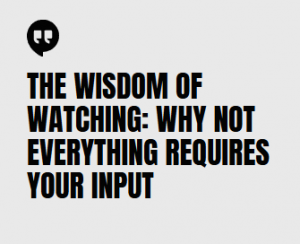
The Wisdom of Watching: Why Not Everything Requires Your Input
In a world where everyone seems to have an opinion, choosing not to add yours can be a powerful act. Tymoff’s lesson teaches us the value of simply watching without feeling the need to contribute to every discussion or decision. Observing quietly allows you to learn, understand, and reflect without getting entangled in unnecessary debates. It’s a practice that helps you conserve energy and focus on areas where your input truly makes a difference.
How “Not Everything Need – Tymoff” Encourages Thoughtful Leadership
Great leaders know that not every issue demands an immediate response. Tymoff’s principle aligns perfectly with thoughtful leadership, teaching leaders to observe situations fully before making decisions. This approach fosters a culture of reflection, patience, and intentionality within teams. By modeling this behavior, leaders inspire their teams to think critically and act purposefully, creating a more cohesive and effective work environment.
The Quiet Power of Observation: A Guide to Mindful Living
Observation is a cornerstone of mindfulness, and Tymoff’s message encourages us to embrace it wholeheartedly. The quiet power of observation lies in its ability to anchor you in the present moment. By watching without judgment, you cultivate awareness and gratitude for what is happening here and now. This practice not only reduces stress but also enhances your appreciation for life’s subtleties, fostering a deeper sense of contentment and fulfillment.
Learn to Sit Back and Observe: Creating Space for Clarity and Calm
Clarity often emerges in the space between action and inaction. Tymoff’s philosophy of sitting back and observing invites you to create this space intentionally. By pausing, you allow your mind to settle and your emotions to stabilize, making it easier to see situations clearly. This clarity helps you approach challenges with a calm and measured perspective, enabling you to find solutions that align with your values and long-term goals.
How to Embrace Tymoff’s Wisdom for a More Balanced Life
Balance is about knowing when to act and when to observe, and Tymoff’s wisdom provides the perfect framework for achieving it. By embracing the principle of “not everything need,” you free yourself from the pressure to always be “on.” This balance allows you to allocate your time and energy more effectively, focusing on what truly matters while letting go of distractions. It’s a mindset that promotes harmony in every area of your life, from work to relationships to personal growth.
“Learn to sit back and observe. Not everything need” – Tymoff’s insightful philosophy encourages us to adopt a more mindful, deliberate approach to life. In a world that often pushes us toward constant action, learning to step back, observe, and reflect allows us to make better choices, reduce unnecessary stress, and foster deeper connections with ourselves and others. This practice isn’t about disengagement, but rather about discerning when to act and when to simply be present, creating space for clarity, calm, and intentional living.
By embracing this mindset, we can enhance our emotional resilience, improve decision-making, and cultivate a sense of inner peace. Whether applied to work, relationships, or personal growth, the ability to observe without immediately reacting opens up new possibilities for a more thoughtful, balanced, and fulfilled life. So, the next time you feel overwhelmed or uncertain, remember the power of observation—sometimes the best response is simply to pause and let things unfold.



